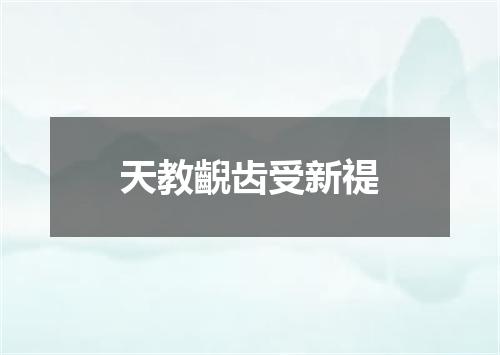“天教齯齿受新禔”出自宋代项安世的《又代作》,诗句共7个字,诗句拼音为:tiān jiào ní chǐ shòu xīn zhī,诗句平仄:平仄平仄仄平平。
“天教齯齿受新禔”全诗:
绛帷犀镇绣帘低,翠竹龙香锦帕齐。
百柂琼艘倾竹醖,千年眉寿辑萱闺。
堂东已见床堆笏,庭下行看玉满畦。
岁晚逢春知有意,天教齯齿受新禔。
《又代作》是宋代诗人项安世的作品,以下是它的中文译文、诗意和赏析:
绛帷犀镇绣帘低,
红色帷幕上挂着犀牛角,绣帘垂得很低,
The crimson curtains are adorned with rhinoceros horns, and the embroidered drapes hang low.
翠竹龙香锦帕齐。
碧绿的竹子上系着龙香的锦帕。
On the emerald bamboo, a silk handkerchief scented with the aroma of dragons is neatly tied.
百柂琼艘倾竹醖,
一百艘装满琼浆的船倾斜在竹子上,
Hundreds of boats filled with nectar-like wine lean against the bamboo,
千年眉寿辑萱闺。
千年来历代美人的眉目和寿命都被辑录在萱闺(美女之屋)中。
For a thousand years, the eyebrows and longevity of beautiful women from past dynasties have been recorded in the "Xuan Gui" (Chamber of Beauties).
堂东已见床堆笏,
东厢的床上已经堆满了文房四宝(笔墨纸砚),
In the eastern chamber, the bed is already piled with the four treasures of the study (brush, ink, paper, and inkstone),
庭下行看玉满畦。
在庭院里行走,看到玉石装满了花坛。
Walking in the courtyard, one can see jade stones filling the flower beds.
岁晚逢春知有意,
年岁已晚,却遇到了春天的气息,知道其中蕴含深意,
In the late years, encountering the breath of spring, understanding the profound meaning within,
天教齯齿受新禔。
天空让年老的牙齿尝到新年的福祉。
The heavens grant the aged teeth to taste the blessings of the new year.
诗意与赏析:
《又代作》以细腻的描写和意象构建了一幅富有生动色彩的画面。诗中运用了丰富的色彩和物象,展现了繁华富丽的场景,同时也透露出岁月更迭、光阴易逝的人生哲理。
诗中的绛帷、犀镇、绣帘、翠竹、龙香、锦帕等形象,通过视觉和嗅觉的感受,勾勒出一个华丽而奢靡的环境。诗人以船倾斜在竹子上、美人的眉目和寿命被辑录等意象,揭示了历史的传承和人生的匆匆流转。
诗末,诗人通过岁晚逢春、齯齿受新禔的描写,表达了对时光的感慨和对新年的期盼。这种对岁月的思考和对生命的瞬息感知,使诗作在繁华中凸显了深度和哲理。
《又代作》通过细腻描写和意象的运用,以华丽的场景展示了岁月变迁和人生哲理,给人以美的享受和深思。它在宋代诗词中具有独特的艺术价值。
yòu dài zuò
又代作
jiàng wéi xī zhèn xiù lián dī, cuì zhú lóng xiāng jǐn pà qí.
绛帷犀镇绣帘低,翠竹龙香锦帕齐。
bǎi yí qióng sōu qīng zhú yùn, qiān nián méi shòu jí xuān guī.
百柂琼艘倾竹醖,千年眉寿辑萱闺。
táng dōng yǐ jiàn chuáng duī hù, tíng xià xíng kàn yù mǎn qí.
堂东已见床堆笏,庭下行看玉满畦。
suì wǎn féng chūn zhī yǒu yì, tiān jiào ní chǐ shòu xīn zhī.
岁晚逢春知有意,天教齯齿受新禔。
拼音:tiān jiào ní chǐ shòu xīn zhī
平仄:平仄平仄仄平平
韵脚: